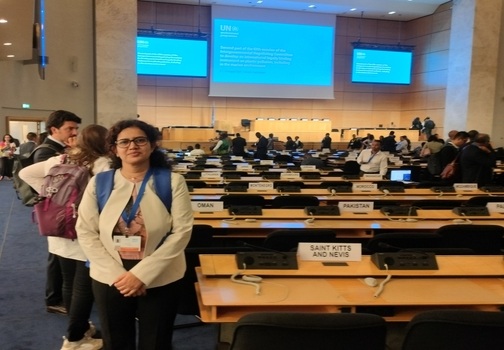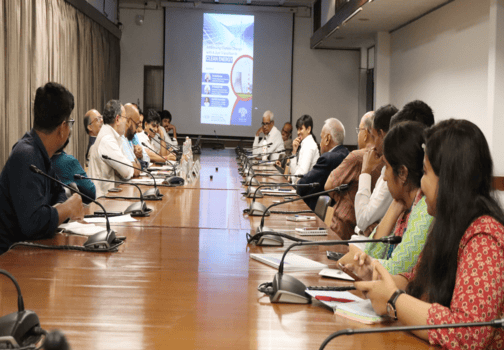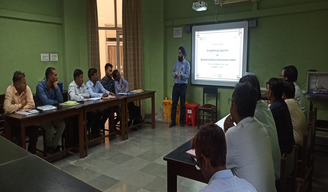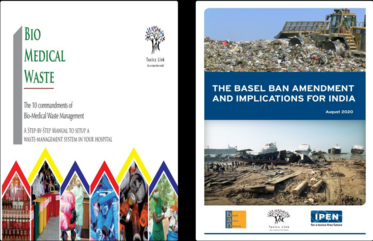Heavy Metal in Rivers
GOVERNMENT OF INDIA
MINISTRY OF JAL SHAKTI
LOK SABHA
UNSTARRED QUESTION NO: 30771950
ANSWERED ON: 09.12.2021
Heavy Metal in Rivers
Queen Oja
Arvind Kumar Sharma
Bharatiben Dhirubhai Shyal
Will the Minister of JAL SHAKTI be pleased to state:-
(a) whether it is true that two third of water quality stations on major rivers have presence of one or more heavy metal beyond permissible limit;
(b) if so, the details of efforts being made or planned by Government to address this situation; and
(c) if not, the reasons therefor?
ANSWER
THE MINISTER OF STATE FOR JAL SHAKTI
(SHRI BISHWESWAR TUDU)
(a) to (c) Rivers in the country are polluted and contaminated mainly due to discharge of untreated and partially treated sewage from cities/towns and industrial effluents in their respective catchments. Non-point source of pollution like erosion, transportation and sedimentation of rocks, soils, agriculture runoff, open defecation and runoff from solid waste dumping sites, etc. also contribute to pollution of river. Central Pollution Control Board (CPCB) in association with State Pollution Control Boards/Committees in different States/Union Territories (UTs) have been monitoring water quality of rivers and other water bodies, across the country through a network of 4294 monitoring stations under the National Water Quality Monitoring Programme. The monitoring is conducted and samples analyzed for various physico-chemical, micro- biological and micro-pollutants (metals & pesticides) parameters as per Guidelines for Water Quality Monitoring, 2017 issued by Ministry of Environment, Forest & Climate Change (MoEF&CC).
The trace metals attached to sediment particles are migrated and dispersed in the flood plains due to annual flushing of streams and rivers. Other sources of metals in rivers are primarily industrial activities. The concentration range of various heavy metals such as Arsenic (Ar), Cadmium (Cd), Copper (Cu), Lead (Pb), Chromium (Cr), Nickel (Ni), Zinc (Zn), Mercury (Hg), Iron (Fe) and Manganese (Mn) observed in major rivers of the country during the year 2020 is given at Annexure-I.CPCB have also informed that at present no limits have been prescribed under Primary Water Quality Criteria for Bathing Waters notified under the Environment Protection Act, 1986 by MoEF&CC to check presence of heavy metals in rivers beyond permissible limits.
Contd…P/2
//2//
Cleaning/rejuvenation of rivers is an ongoing activity. It is the responsibility of the States/UTs and local bodies to ensure required treatment of sewage and industrial effluents to the prescribed norms before discharging into river and other water bodies, coastal waters or land to prevent and control of pollution therein. For conservation of rivers, this Ministry has been supplementing the efforts of States/UTs by providing financial and technical assistance for abatement of pollution in identified stretches of rivers in the country through the Central Sector Scheme of NamamiGange for rivers in Ganga basin and the Centrally Sponsored Scheme of National River Conservation Plan (NRCP) for other rivers.
NRCP has so far covered polluted stretches on 34 rivers in 77 towns spread over 16 States in the country with the project sanctioned cost of Rs.5961.75 crore, and inter-alia, a sewage treatment capacity of 2677.03 MLD (million litres per day) has been created. Under the NamamiGangeprogramme, a total of 353 projects, including 157 projects for sewage treatment of 4952 MLD and sewer network of 5212 kms., have been sanctioned at a cost of Rs.30458 crore.
In addition, sewerage infrastructure is created under programs like Atal Mission for Rejuvenation & Urban Transformation (AMRUT) and Smart Cities Mission of Ministry of Housing & Urban Affairs.
As per the Provisions of Environment (Protection) Act, 1986 and Water (Prevention & Control of Pollution), Act 1974, industrial units are required to install effluent treatment plants (ETPs) and treat their effluents to comply with stipulated environmental standards before discharging into river and water bodies. Accordingly, CPCB, State Pollution Control Boards/Pollution Control Committees monitor industries with respect to effluent discharge standards and take action for non-compliance under provisions of these Acts.
Besides, in compliance of the orders of National Green Tribunal (NGT) in Original Application No.673/2018 regarding rejuvenation of polluted river stretches in the country, States/UTs are required to implement approved action plans for restoration of the polluted stretches in their jurisdiction as identified by CPCB and published in their report of 2018, within the stipulated timelines. As per the orders of NGT, regular review on implementation of action plans is undertaken in the States/UTs and also at Central level.
ANNEXURE-I
Annexure referred to in reply to parts (a) to (c) of Lok Sabha Unstarred Question No. 1950 to be answered on the 09.12.2021 regarding ‘Heavy Metal in Rivers”.
RIVER WISE – HEAVY METAL (Ar, Cd, Cu, Pb& Cr) OBSERVED IN YEAR 2020
Sl. No. Name of River Monitored Parameters – Heavy Metals
Arsenic (mg/L) Cadmium (mg/L) Copper (mg/L) Lead (mg/L) Chromium Total (mg/L)
Min Max Min Max Min Max Min Max Min Max
1 BAITARNI – – 0.0006 0.0018 0.002 0.019 0.002 0.008 – –
2 BEAS BDL BDL BDL BDL BDL BDL BDL BDL BDL 0.06
3 BRAHMANI – – 0.0004 0.0023 0.001 0.03 0.004 0.011 – –
4 BRAHMAPUTRA BDL BDL BDL BDL 0.003 0.006 BDL BDL BDL BDL
5 CAUVERY BDL 0.01 0.0008 0.02 0.0015 0.3 0.006 0.1 0.05 0.06
6 CHAMBAL – – BDL 0.001 BDL 0.095 BDL 0.039 BDL 0.015
7 GANGA 0.00049 0.01 0.00042 0.00042 0.00035 0.015 0.00031 0.01 0.00056 0.42
8 GHAGGAR BDL BDL 0.00042 0.9 0.00035 0.17 0.00031 0.419 0.00056 0.6
9 GODAVARI 0.001 0.09 0.02 0.09 0.002 0.09 0.001 0.09 0.005 0.09
10 KRISHNA 0.00083 0.01 0.00001 0.09 0.00243 0.09 0.00002 0.09 0.00026 0.09
11 MAHANADI BDL 0.01 0.0006 0.02 0.001 0.039 0.001 0.199 0.008 0.06
12 MAHI BDL BDL 0.0004 0.008 0.001 0.02 BDL 0.013 BDL 0.003
13 NARMADA BDL BDL 0.017 0.026 0.007 0.012 BDL BDL BDL BDL
14 PENNAR 0.00327 0.00327 0.00008 0.00008 0.008 0.043 0.00209 0.041 0.0011 0.043
15 SABARMATI 0.005 0.005 BDL BDL 0.015 0.38 0.012 0.012 0.005 0.06
16 SATLUJ 0.01 0.01 0.00042 0.02 0.00035 0.3 0.00031 0.1 0.00056 0.2
17 TAPI BDL BDL BDL BDL BDL BDL BDL BDL BDL BDL
18 YAMUNA BDL 0.00049 0.00042 0.42 0.00035 0.35 0.00031 0.31 0.00056 0.56
RIVER WISE – HEAVY METAL (Ni, Zn, Hg, Fe, &Mn) OBSERVED IN YEAR 2020
Sl. No. Name of River Monitored Parameter – Heavy Metals
Nickel (mg/L) Zinc (mg/L) Mercury (mg/L) Iron (mg/L) Manganese (mg/L)
Min Max Min Max Min Max Min Max Min Max
1 BAITARNI 0.004 0.022 0.001 0.048 0.00006 0.00057 0.094 1.165 – –
2 BEAS BDL 0.1 0.003 0.287 0.001 0.001 BDL 1.54 – –
3 BRAHMANI 0.002 0.013 0.001 0.177 0.00006 0.00083 0.007 1.317 – –
4 BRAHMAPUTRA BDL BDL 0.01 0.064 BDL BDL 0.014 0.16 – –
5 CAUVERY 0.006 0.1 0.0015 0.3 0.001 0.003 0.05 1.013 0.047 0.1
6 CHAMBAL BDL 0.09 0.0217 2.37 – – 0.015 1.23 0.037 0.169
7 GANGA 0.00054 0.04 0.003 0.23 0.0001 0.0001 0.06 13.66 0.04 0.27
8 GHAGGAR 0.00054 0.4 0.01 0.7 BDL 0.001 0.29 67.7 0.05 3.29
9 GODAVARI 0.001 0.09 0.001 0.09 0.09 0.09 0.002 3.139 – –
10 KRISHNA 0.00008 0.09 0.00028 0.09 0.00024 0.09 0.00779 0.273 0.021 0.078
11 MAHANADI 0.001 0.1 0.002 0.46 0.00006 0.001 0.034 1.625 0.1 3.89
12 MAHI 0.09 0.09 0.0104 0.457 BDL BDL 0.04 0.744 0.0715 0.1674
13 NARMADA 0.003 0.151 0.028 0.05 BDL BDL 0.04 0.563 0.002 0.02
14 PENNAR 0.00123 0.00123 0.0046 0.165 0.00315 0.00315 0.161 1.333 0.014 0.242
15 SABARMATI 0.005 0.026 0.017 0.19 BDL BDL 0.02 1.69 0.003 0.1
16 SATLUJ 0.00054 0.1 0.00059 11 0.001 0.001 0.1 7.08 BDL 0.92
17 TAPI BDL BDL BDL BDL BDL BDL 0.07 0.07 – –
18 YAMUNA 0.00054 0.54 0.00059 1.15 BDL BDL 0.029 15.89 0.02 0.56
- BDL- Below the Detection Limit






